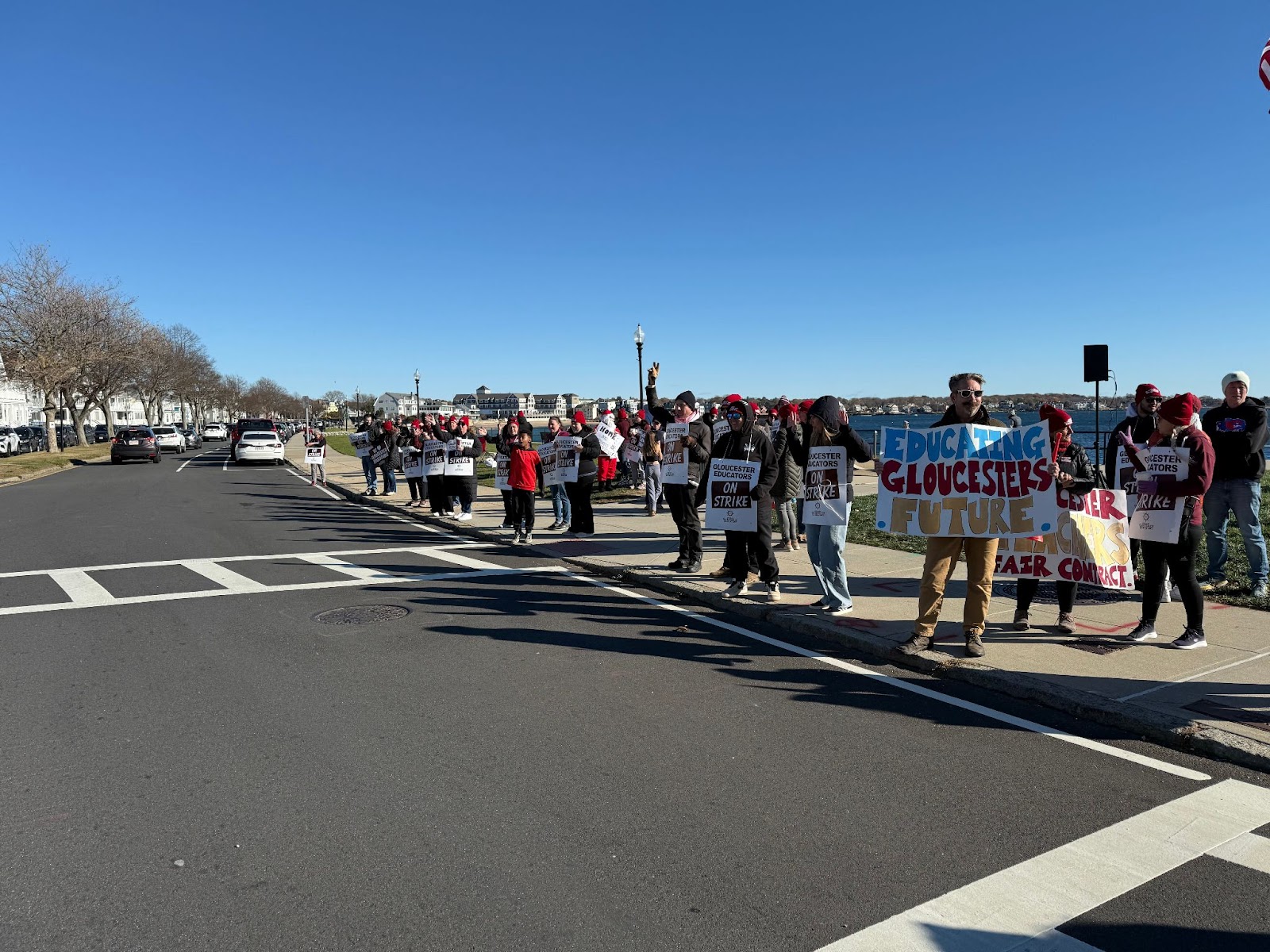[[{“value”:”
By Nick Lavin
10:1 – the recommended ratio of union members to Contract Action Team (CAT) members – was the watchword of everyone on the picket line this weekend in Beverly and Gloucester as they turned out virtually every member to the picket line on regular intervals. After months without a contract, educators in both towns voted overwhelmingly to strike beginning Friday, with Marblehead set to join them on Tuesday. Here’s what the teachers, counselors, and paraprofessionals on the line had to say about their efforts to Working Mass.
“The North Shore Is Taking Its Schools Back”
The Beverly and Gloucester teachers unions, each representing over 400 educators and other school staff, have been fighting for a fair contract for months – and in the case of Gloucester’s paraprofessionals, since June of last year. Inspired by the strike actions in several other towns and cities across the state, union members took the problem of underfunded public education into their own hands and started organizing.
Years of methodical shop-floor organizing and months of contract campaign escalations culminated this fall as North Shore educators set the date for a strike – November 8th. After turning broadly and deeply felt issues over pay equity, staffing, and general working conditions into a contract proposal for teacher- and student-well-being, the unions were ready to bring the proposals back to their workplaces. Union member-organizers started “Contract Action Teams” in their buildings to develop the strength needed to take on their districts, holding 1:1 conversations, turning out as ‘silent reps’ to negotiations with the city, and rallying.
Turning Up the Heat
When federal pandemic-era relief money ran out during the last school year, Gloucester laid off twenty-two educators, a loss felt deeply in the classroom. To the paraprofessionals expected to pick up the slack as sub-separate classes became ‘inclusion’ with less resources, the district suggested they apply for second jobs (which many already have) rather than increasing their pay. This blatant disregard for the work of paras is part of what motivated the merger of Gloucester paraprofessional and teacher units, says Margaret Rudolf, an eighteen-year special-ed paraprofessional: “when we started sharing [our story] with the GTA [Gloucester Teachers Association], they were appalled at how little we made.”
Paraprofessional pay equity is a sticking point in negotiations for all union members. The housing crisis emanating from Boston hits paras especially hard in the commuter towns of Beverly and Gloucester, who make as little as $20,000 a year.
Educational staff were exasperated by the systemic underfunding of public schooling, and the union was ready to organize the frustration into positive action. “Our program in negotiations were the solutions to the problems that we see in our schools and in our district. The district says ‘oh we hear you’ but then they reject all our proposals” said Rachel Rex, president of the Union of Gloucester Educators.
Consistent stonewalling from city administration over basic school needs forced teachers to organize to take more militant action to ensure both they and their students get the resources they need. Rather than listening to parents and educators, city administrators have turned to the typical teachers-union-busting textbook, calling on the courts to issue injunctions against the strikes.
Community Support
Educators on the North Shore are taking on local politicians over public education – and bringing the community with them. Educators in both Beverly and Gloucester reported that, despite the stories coming out of the school committees about the union, community support for the strike has been overwhelming. Across the North Shore, pro-union signs are ubiquitous, and the supportive honking as cars streamed by the pickets was incessant.
Because the union teachers are so beloved in Gloucester, the city’s administration centers a different villain in their union-busting narrative. Officials have taken to blaming the Massachusetts Teachers Association [MTA]. “The narrative is that MTA has caused these strikes, but let me be clear: my members made this decision,” said Rex. This line of attack, called ‘third-partying’, seeks to drive a wedge not only between workers and their union, but also between the union and the greater community. As politicians try to steer austerity against the tide of renewed teacher militancy and community frustration over school budgets, third-partying has become a common, if ineffective, rhetorical crutch across Massachusetts.
Both the Beverly and Gloucester teachers unions have launched strike support fundraisers, and don’t intend to back down: “we’ve finally found our voice and enough is enough… you can’t break us anymore, you can’t burn us out. We need a living wage, we need a parental leave policy, we need safe schools, we need the tools so that we can properly educate our students.”
Anger over the cities’ treatment of educators in both the union and the community has reached a boiling point and members are ready to transform their union power into political power. Once they win their contract, says Rex, GTA’s next campaign is “to change the political landscape here in Gloucester.“ Community members, business owners, and the union are fed up with the status quo and ready to elect people who care about safe schools and fully-funded public education.
Nick Lavin is a Boston Public Schools paraprofessional and a member of the Boston Teachers Union.
“}]]

